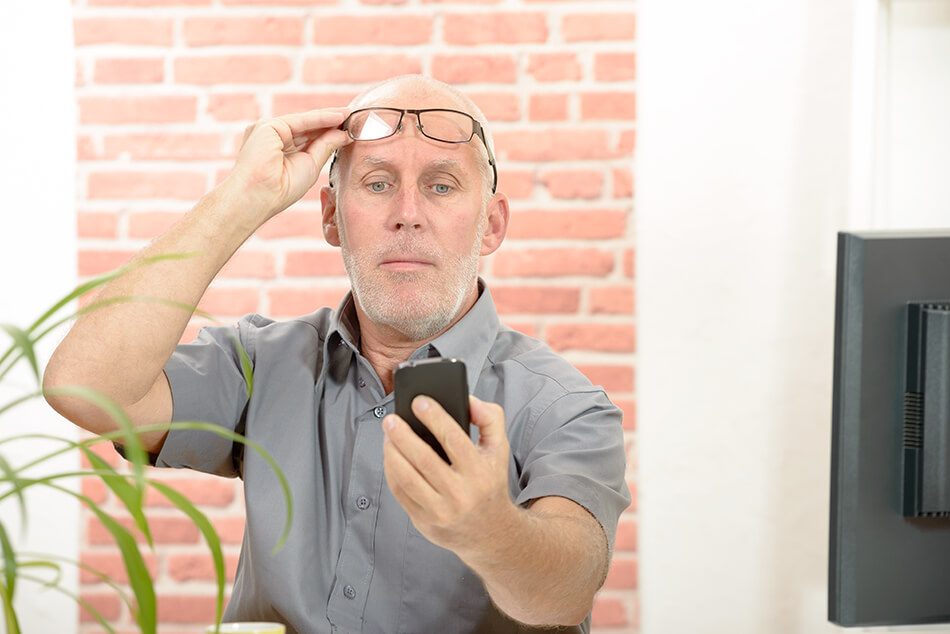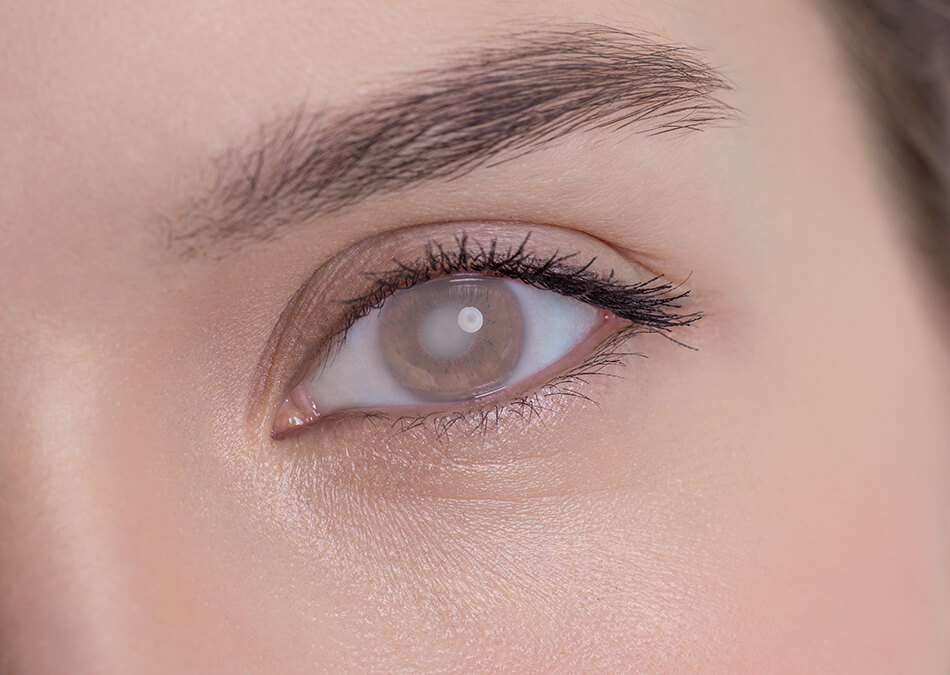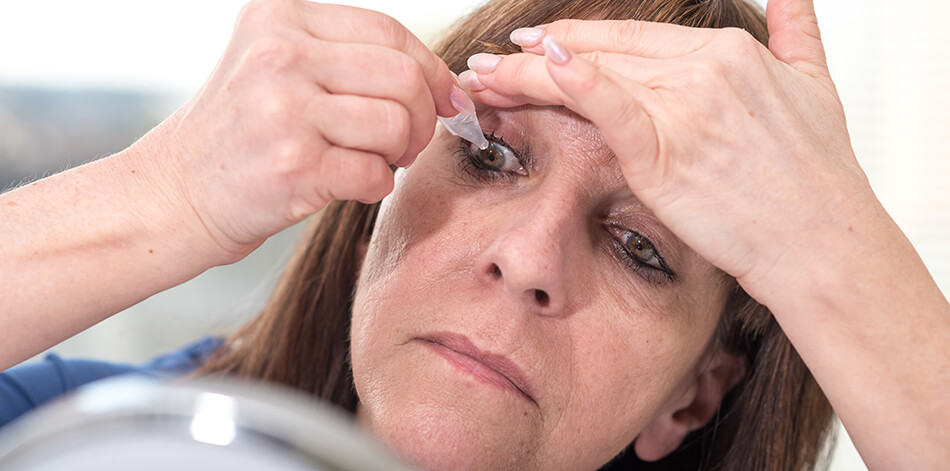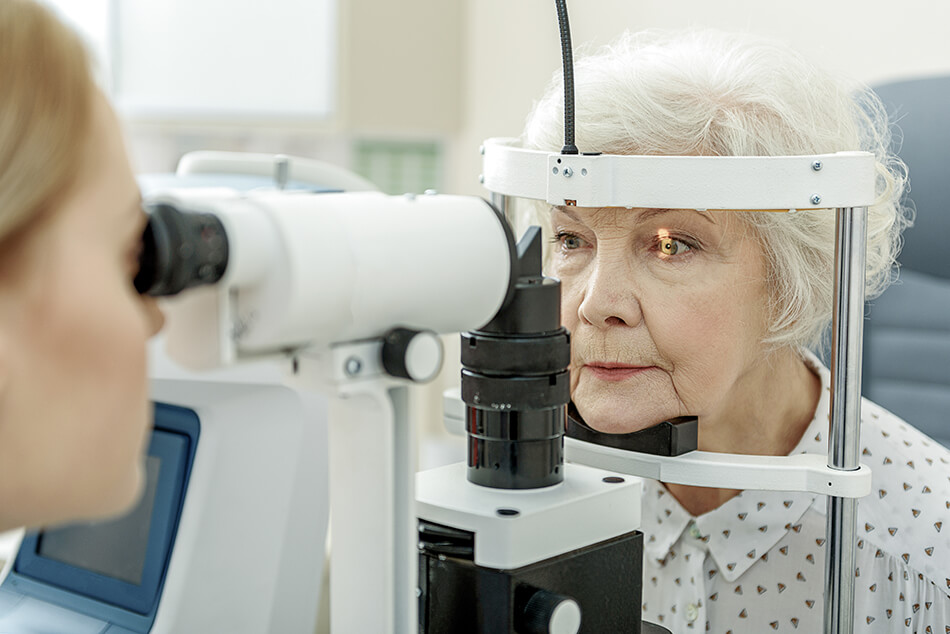Protecting Your Eyesight From Age-Related Eye Problems

Our eyesight naturally degrades as we age. That’s a simple fact. Glasses and contact lenses become essential for maintaining vision. However, poor eye health can be avoided. Protecting your eyes from age-related eye problems is possible. Let’s look at some of the most common eye issues associated with aging and learn what to do to keep your eyes strong and healthy.
Presbyopia
Presbyopia is a fancy name for needing glasses to read as your eyes age. This even happens to those who previously had perfect eyesight.

You might have presbyopia if you have the following symptoms:
- Difficulty seeing objects that are near
- Trouble seeing when lighting is poor
- Eye fatigue
- Inability to read fine print
This happens because the lenses in our eyes become less flexible. Lenses need to be flexible, so they can adjust focus from near to far quickly and easily. As our eyes lose this flexibility, focusing close-up becomes more difficult.
Although eye doctors say that you cannot prevent presbyopia, some people have found that maintaining strong eyes helps. They keep their eyes strong through simple exercises. Some exercises are distant object focusing, arm’s length focusing, and the clock face exercise.
Macular Degeneration
For American seniors over the age of fifty, macular degeneration is the main cause of vision issues and blindness. Although age and genetics play a role, there are several other risk factors including:
- Det
- Family history
- High blood pressure
- Obesity
- Smoking
As a result of macular degeneration, vision loss occurs in the center of the eye. But, those with macular degeneration will often keep peripheral vision.
However, there are a few things you can do to prevent macular degeneration or slow its course. These include:
- Stop smoking
- Eating large amounts of leafy green vegetables
- Taking a multivitamin
- Getting omega-3 fatty acids by eating fish or taking a fish oil supplement
- Maintaining a healthy weight
- Eating plenty of fruits and nuts
- Protecting your eyes from UV rays by wearing sunglasses
- Having your eyes checked regularly - the faster you catch the problem, the more likely you are to slow its progress
Cataracts

Another common eye disease that leaves people with poor vision is cataracts. This eye disease affects more than 24 million Americans over the age of 40. Over half of Americans over the age of 80 have cataracts.
A person with a cataract has a clouded lens. This causes the inability to see clearly. As a result, cataracts are typically treated with surgery to replace the lens.
Although cataracts are treatable, preventing them is beneficial. Here are a few things you can do to reduce your risk of cataracts:
- Eat a diet containing lutein, found in leafy green vegetables
- Add omega-3 fatty acids to your diet by eating fish
- Eat foods high in antioxidants like beta-carotene, selenium, Vitamin C, and Vitamin E
- Stop smoking which doubles your chance of developing cataracts
- Wear sunglasses to protect your eyes from UV ray damage
- Maintain a healthy weight to keep diabetes under control
- Limit your use of corticosteroid medications
Dry Eyes

As you age, your body naturally produces fewer tears. That’s why dry eyes is a common ailment among older people.
Symptoms of dry eyes include:
- Red or bloodshot eyes
- Feeling like sand is in your eyes
- Stinging sensation in your eyes
The best way to relieve dry eyes is with moisturizing eye drops. However, to prevent dry eyes, you can try the following:
- Avoid areas with cigarette smoke
- Stay out of the wind
- Add a humidifier to your home
- Add omega-3 fatty acids to your diet
Glaucoma
Glaucoma is actually a group of eye diseases that progressively damage the optic nerve due to high pressure inside the eye. Those with glaucoma can have permanent vision loss or even blindness if left untreated.
Unfortunately, many forms of glaucoma have no symptoms until vision loss occurs. That is why it is so important to see your eye doctor regularly. They will dilate your eyes to look for early signs of optic nerve damage. If found, there are ways to slow down the progress of the disease.

Although glaucoma cannot be prevented, there are things you can do for healthy eyes. These include:
- Tell your doctor of a family history of glaucoma since it is genetic. Your doctor may suggest more frequent eye exams.
- Some studies suggest that moderate exercise may reduce eye pressure.
- If you have glaucoma, take your eye drops as directed. This is true even if you experience no symptoms.
- Protect your eyes from damage when playing sports or using power tools. Eye injuries increase the risk of glaucoma.
Detached Retina
This eye problem requires immediate help from a doctor. This happens when the retina pulls away as cells in the retina no longer get nourishment or oxygen. This leads to vision loss.
Since immediate care is required, you should know the signs of a detached retina:
- Floaters or flashes of light that appear suddenly
- Blurry vision
- Reduced peripheral vision
- A shadow-like presence across your visual field
If you notice these symptoms, go to the emergency room or contact your eye doctor immediately.
To prevent a detached retina, do the following:
- Tell your doctor of any family history of detached retinas.
- Have regular eye exams with dilation. Your eye doctor will be able to see small tears and repair them before any damage occurs.
- Always have an eye exam after an eye injury. This will allow your doctor to see if any small tears exist.
- Wear safety glasses to avoid eye injuries.
Finally, know the warning signs. The faster you get to the doctor, the more likely they will be able to fix the tear before you experience permanent vision loss.
Aging and Contact Lenses

Since most people over the age of 60 need corrective lenses, it’s good to know your options.
Years ago, the only option available for presbyopia was bifocal eyeglasses. However, contact lenses are now available. Known as multifocal lenses, contact lenses provide the ability to see far away, close up, and everything in between.
Additionally, those with eye diseases like glaucoma can continue wearing contact lenses. Be sure to speak to your eye doctor to determine what is best for your eyes.
Yes, eyes age. However, eyes do not have to be unhealthy. Protecting your eyesight is as easy as following the tips on this page.
